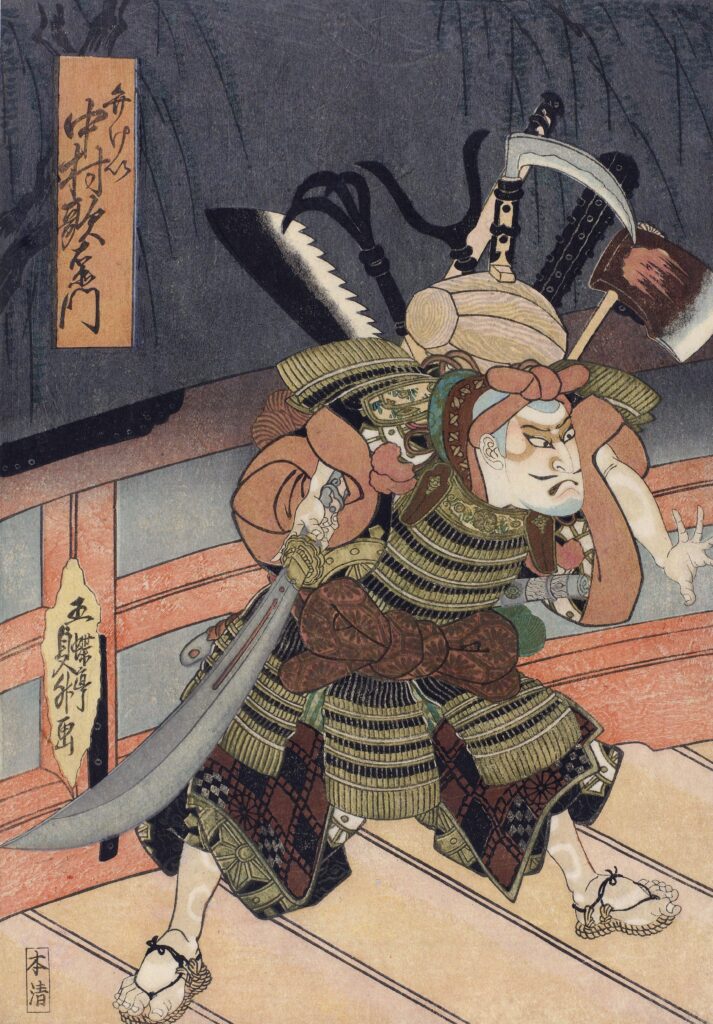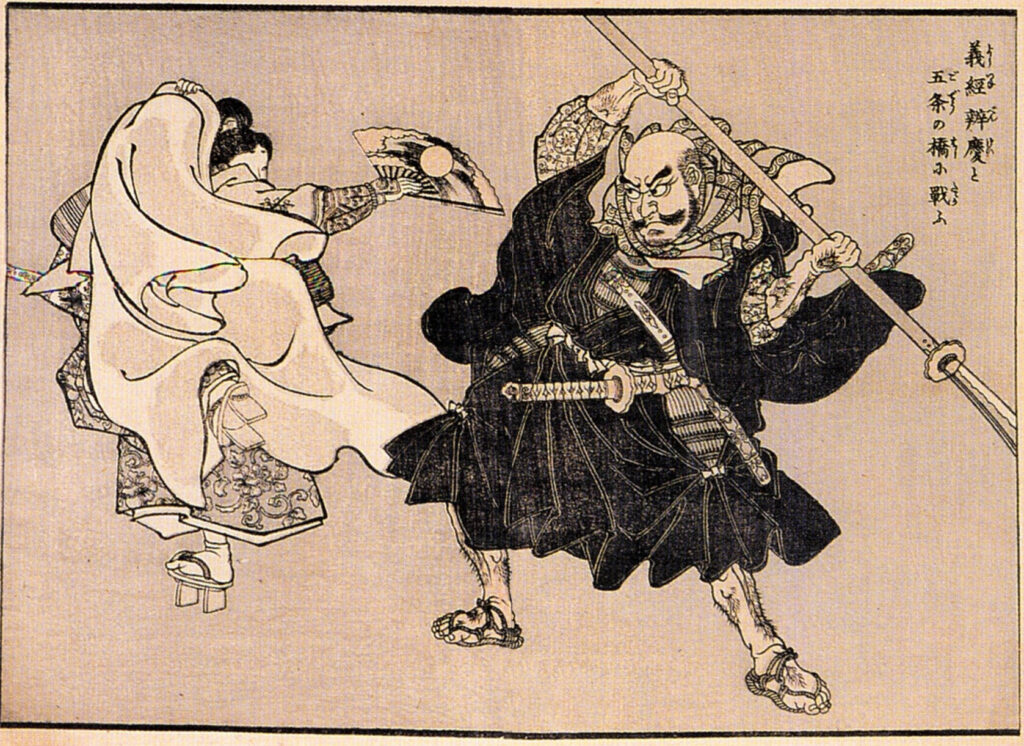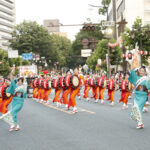

武蔵坊 弁慶 Musashibo Benkei
1151 ~ 1189
Childhood name: Oniwakamaru 鬼若
(Japanese historical figures change their names frequently.)
A powerful man of Anecdotes and Loyalty
Musashibo Benkei, who is said to have been Minamoto no Yoshitsune’s trusted subordinate, has been the subject of many Kabuki plays. It has been said that Benkei was in his mother’s womb for 18 months, and when he was born, he had the body of a 2- or 3-year-old boy, his hair was shoulder length, and his teeth were well-grown. He grew up to be two meters tall and weighed 130 kilograms, and was famous for his tremendous strength. However, it is uncertain how much of his historical records are facts and how much are legends, and there is a high possibility that the stories related to Yoshitsune was also a creation of later generations.
Testing his strength from being told he was the son of an ogre
Benkei’s father, who thought Benkei was a child of an ogre due to his different appearance from a normal baby, tried to kill him, so his aunt took him in, named him Oniwaka, and raised him in Kyoto. He was then sent to Enryaku Temple on Mt. Hieizan, but he was so violent that he could not learn anything and was eventually expelled from the temple. So he shaved his own hair, took the name Musashibo Benkei, then moved from Shikoku to Hyogo and finally back to Kyoto.
To see how far his huge body and monstrous strength would take him, he attempted to steal 1,000 swords in a duel with a passing samurai on the Gojo Ohashi Bridge. As a result, he gathered up to 999 swords, but as he was about to take the last one, Ushiwakamaru (Yoshitsune’s childhood name) appeared, blowing a flute as he passed by.
Encounter with Ushiwakamaru (later Yoshitsune)
This episode is the origin of the nursery rhyme “Ushiwakamaru,” which is well known to Japanese children today. Benkei attacks Ushiwakamaru, who appeared to look very weak but had a magnificent sword at his waist.
Ushiwakamaru, however, jumped over the parapet of the Gojo Ohashi Bridge with the swiftness of a swallow and dodged Benkei’s huge swinging attack, spectacularly defeating Benkei.
After Ushiwakamaru grew up, he joined his elder brother Minamoto no Yoritomo’s army to overthrow the Heike clan, and Benkei became Yoshitsune’s best partner. Ironically, however, Yoshitsune and his men’s successes were seen by Yoritomo as a threat to his own position.
Yoshitsune and Benkei were placed on what is known today as a “nationwide wanted list” by his elder brother Yoritomo, so they were forced to flee to the Oshu Fujiwara clan (Iwate Prefecture), where they were caught at a barrier and subjected to an inspection. Yoshitsune and his party pretended to be yamabushi (traveling monks), but they were suspected by the guards at the barrier. Benkei quickly and tactfully read the “Kanjincho,” a scroll used to propagate Buddhism, and claimed to be a real monk.
The scroll he opened was completely blank. The guards were completely deceived and let the group through, but when they found a person resembling Yoshitsune among the group, their suspicions were once again aroused. Benkei, in order to clear his suspicions, repeatedly beat Yoshitsune with a stick.
The bond with Yoshitsune
When Minamoto no Yoshitsune was suspected, Benkei struck him repeatedly with his vajra staff, saying, “Because you resemble Yoshitsune, you have been unjustly suspected.” It’s told that the barrier guard was moved by Benkei’s willingness to hurt his master, so he pretended to be deceived and allowed Minamoto no Yoshitsune’s party to pass through. Benkei, who had safely crossed the barrier, is said to have wept and apologized for having struck his master unintentionally. Yoshitsune, however, praises this as true loyalty.
Beating one’s master with a stick was unthinkable for a samurai of that time. All in order to save Yoshitsune, Benkei cried in his heart and took such actions. Knowing this, Yoshitsune also turned his head down and accepted violence from him to respond to Benkei’s heart. This anecdote conveys the trust and bond between the two. It is said that the people at the barrier had no choice but to agree to this and let the barrier pass. This episode is also depicted in the Kabuki play “Kanjincho,” which is very popular.
Benkei’s Final Days
Minamoto no Yoritomo, the elder brother of Yoshitsune, demanded that the Fujiwara clan in Oshu, which was harboring Yoshitsune and Benkei, hunt down and kill Yoshitsune while increasing pressure by demanding a proclamation to hunt down and kill the Fujiwara clan in Oshu. The Fujiwara clan, succumbing to this pressure, drove Yoshitsune into a corner. Benkei stood alone in front of the gate to buy time for Yoshitsune, who was holed up in the hall, to commit suicide.
“I will not let the enemy take my master’s head,” Benkei said. Benkei fought with determination, and it’s said that he continued to fight even though he was pierced with arrows all over his body. In the end, Benkei was hit by a rain of his enemy’s arrows, but he did not fall down and continued to stand with his eyes wide open. Fujiwara’s army was terrified by the fact that Benkei did not die, no matter how many arrows pierced his body.
This episode gave rise to the phrase “Benkei no tachiojo” (meaning “dying”).

Words born from Benkei:
Although it is questionable whether Musashibo Benkei actually existed or not, his loyalty, tact, strength, and boldness may have been the ideal characteristics of a samurai of his time, as seen in “Benkei no tachi-ojou,” the story of Benkei protecting Yoshitsune to the end of his life.
There are many words born from Benkei’s heroism, and here we introduce two of them: “Benkei no nakidokoro” and “Uchi-Benkei.”
・Benkei no nakidokoro
The name “Benkei no weibizukoro” refers to the other side of the body, and means “so painful that even a man as powerful as Benkei cries out in pain.” In other words, it also means the weakest part of a person, a point of weakness, or a vital point.
・Uchi-benkei
It is also used as a set phrase such as “uchibenkei, gaijizo.” It refers to a person who is domineering at home and in front of people they know well, but quiet and timid in front of people they do not know well or with whom they have never met before.
.
.
.




